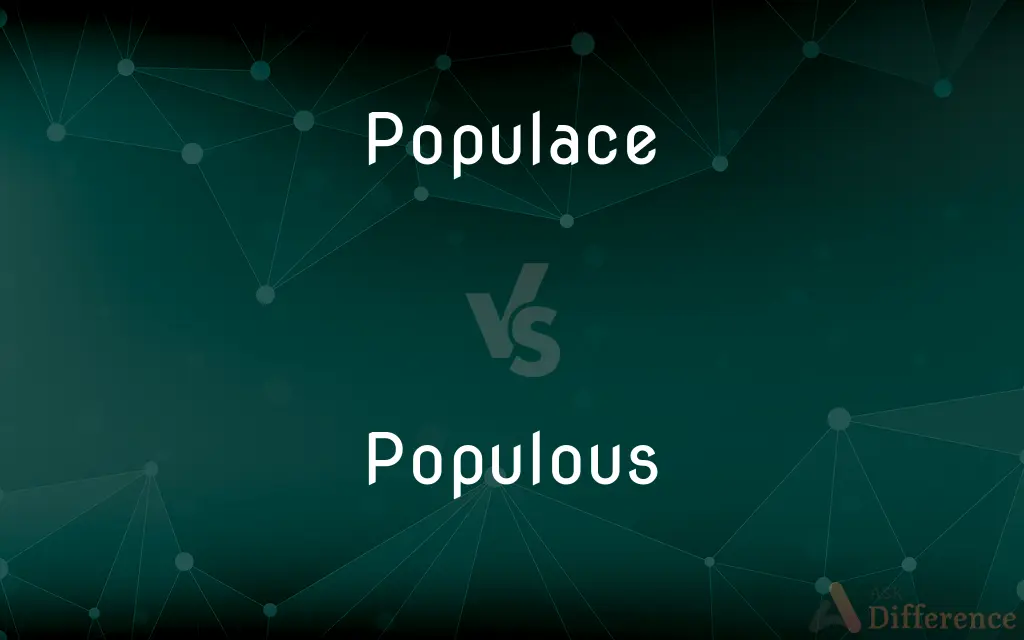Populace vs. Populous — What's the Difference?
By Tayyaba Rehman & Fiza Rafique — Updated on April 17, 2024
Populace refers to the people residing in a particular area, emphasizing their collective aspect, whereas populous describes a place characterized by a high population density.

Difference Between Populace and Populous
Table of Contents
ADVERTISEMENT
Key Differences
The term 'populace' denotes the inhabitants or people of a specific area, typically used to refer to the general population or the masses. On the other hand, 'populous' is an adjective that describes any area that is densely populated. It highlights the characteristic of a location rather than the people themselves.
'Populace' often carries a slightly more formal or literary tone, suggesting a broad, somewhat undifferentiated group of people. Whereas 'populous' is used more objectively to describe the statistical or observable condition of a place regarding its population size.
When discussing demographic statistics or urban planning, 'populous' is the more appropriate term to denote areas with high human density. Conversely, 'populace' is used more in political, social, or cultural contexts to refer to the people who inhabit a country or region.
In literature or historical texts, 'populace' is frequently used to invoke a sense of community or collective human presence within a narrative. On the other hand, 'populous' might be employed in geographic or travel writings to give a sense of bustling activity and crowdedness.
While 'populace' reflects a more abstract concept of people as a group, 'populous' is quantitatively specific, providing a descriptive attribute of a place based on population metrics.
ADVERTISEMENT
Comparison Chart
Definition
Noun: the people living in a region
Adjective: having a high population
Usage Context
Social, political
Geographic, statistical
Implication
Collective human presence
Description of density
Example Contexts
Political discussions
Demographic studies
Tone
Slightly formal or literary
Objective, descriptive
Compare with Definitions
Populace
The general public or common people.
The new policy was popular among the populace.
Populous
Characterized by high population density.
The populous areas require more infrastructure.
Populace
People living in a political or geographic boundary.
The census aims to count the entire populace.
Populous
Full of residents or inhabitants.
The populous island attracts many tourists.
Populace
All residents of a city.
The mayor addressed the concerns of the populace.
Populous
Densely populated
Populace
The inhabitants of a specific area.
The ancient city's populace was known for its crafts.
Populous
Describing a place with many people.
Mumbai is a populous city.
Populace
A group of people considered collectively.
The novel depicts the struggles of the rural populace.
Populous
Having a large population; densely populated
The populous city of Shanghai
Populace
The people living in a particular country or area
The party misjudged the mood of the populace
Populous
Containing many people or inhabitants; having a large population.
Populace
The general public; the masses.
Populous
Having a large population.
China is the most populous country in the world.
Populace
A population.
Populous
Spoken by a large number of people.
Chinese is the most populous language.
Populace
The common people of a nation.
The populace despised their ignorant leader.
Populous
Densely populated.
The Nile delta is a populous region.
Populace
The inhabitants of a nation.
Populous
Crowded with people.
Airport departure halls are often populous places during the rush hours.
Populace
The common people; the vulgar; the multitude, - comprehending all persons not distinguished by rank, office, education, or profession.
To . . . calm the peers and please the populace.
They . . . call us Britain's barbarous populaces.
Populous
Abounding in people; full of inhabitants; containing many inhabitants in proportion to the extent of the country.
Heaven, yet populous, retainsNumber sufficient to possess her realms.
Populace
People in general considered as a whole;
He is a hero in the eyes of the public
Populous
Popular; famous.
Populous
Common; vulgar.
Populous
Numerous; in large number.
Common Curiosities
Is populace used in a specific context?
Yes, it is often used in social, political, or cultural discussions.
Which term is more common in everyday language?
Populous is more commonly used when referring to demographic characteristics.
How do you describe a city with a large population?
You would describe it as a populous city.
Can the term populace imply a type of demographic?
Typically, it refers broadly to the people living in a particular area without specific demographics.
What does populace mean?
Populace refers to the people or inhabitants of a specific area.
Can populous be used to describe people?
No, populous is used to describe places, not people.
Can I say a "populous group of people"?
No, the correct usage would be "a large populace."
Can the populace be a synonym for society?
Yes, in contexts that discuss the collective aspects of a community or society.
How would a scientist describe a densely inhabited area?
A scientist would likely describe it as a populous area.
What does populous mean?
Populous describes a place that is densely populated.
How do historical texts use the term populace?
Historical texts often use populace to refer to the people of a time or place collectively.
Is there a plural form for populous?
No, populous is an adjective and does not have a plural form.
What is the opposite of populous?
The opposite of populous is sparsely populated or unpopulated.
Is populous a positive or negative description?
It is neutral, simply describing population density.
Do media reports use populace or populous more frequently?
Media reports use populous when referring to areas with high population densities.
Share Your Discovery

Previous Comparison
Chemist vs. Apothecary
Next Comparison
Loaner vs. LoaneeAuthor Spotlight
Written by
Tayyaba RehmanTayyaba Rehman is a distinguished writer, currently serving as a primary contributor to askdifference.com. As a researcher in semantics and etymology, Tayyaba's passion for the complexity of languages and their distinctions has found a perfect home on the platform. Tayyaba delves into the intricacies of language, distinguishing between commonly confused words and phrases, thereby providing clarity for readers worldwide.
Co-written by
Fiza RafiqueFiza Rafique is a skilled content writer at AskDifference.com, where she meticulously refines and enhances written pieces. Drawing from her vast editorial expertise, Fiza ensures clarity, accuracy, and precision in every article. Passionate about language, she continually seeks to elevate the quality of content for readers worldwide.














































